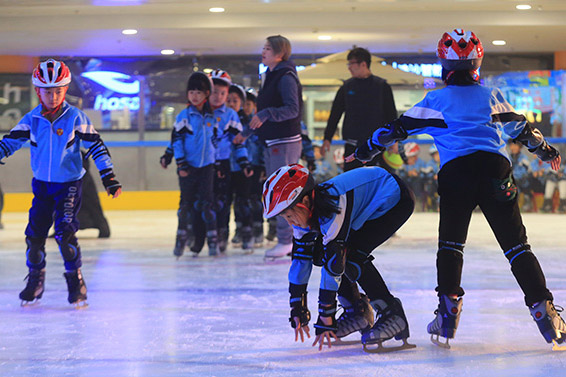
As China steps up preparations ahead of hosting the 2022 Winter Olympic Games, members of the nation’s top political advisory body have urged professional academies and domestic manufacturers to help plug perceived gaps in the country’s winter sports expertise.
A national winter sports promotion program that aims to introduce skiing, ice skating and the like to 2,000 schools by 2020 has been hampered by a lack of qualified instructors, according to Yang Jingzhi, former deputy director of Hebei provincial sports bureau and a member of the National Committee of the Chinese People’s Political Consultative Conference.
“Winter sports require well-trained specialists to safely guide learners. At the moment, we don’t even have enough for the schools program, so the training of instructors should be a priority,” he said.
The winter sports promotion program was highlighted in a development guideline that was issued by the General Administration of Sport in November.
This guideline aims to get 300 million Chinese involved in winter sports by 2022.
Yang Hua, head of Beijing Sport University, suggested that the Education Ministry source part-time instructors from sports academies in Northeast China, where winter sports have long been practiced.
“Even if they can’t be hired as full-time teachers (without the proper qualifications), they could host training clinics for students and other teachers, and the local educational commission could offer them some kind of bonus for doing so,” he said.
Retired Olympic hurdler Liu Xiang, who is also a CPPCC National Committee member, said former athletes could also play a role.
“An athlete’s career need not end when they retire or are no longer able to compete professionally. Becoming an instructor could be a great choice for many former winter sports athletes,” he said.
In addition to a shortage of trained instructors, winter sports development in China is also frustrated by a lack of appropriate facilities. Taishan Sports Industry Group, a Shandong-based sports equipment manufacturer, is looking to change that, however.
The company is currently testing a set of winter sports training equipment, called the ice and snow pack, which was developed with the help of a technical research team based in Sweden specifically for on-campus use.
The set includes an artificial ice rink and a skiing simulator that can easily be disassembled, transported to a different location and reassembled, according to Bian Zhiliang, chairman of the group and a CPPCC National Committee member.
“More than 100 schools in Beijing and Hebei have approached us or shown interest in purchasing or testing the products,” he said.
Starting last year, Beijing selected 18 schools in Haidian district and Yanqing to pilot winter sports training during physical education classes.
The municipal sports authority earlier proposed adding winter sports to the mandatory curricula of the city’s primary and secondary schools, though a decision on the proposal has yet to be made.
